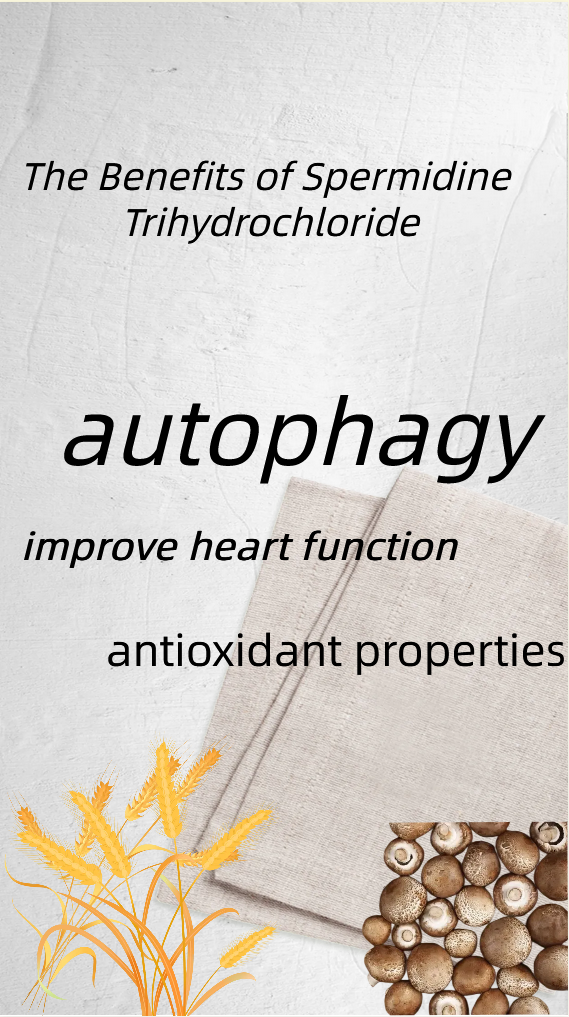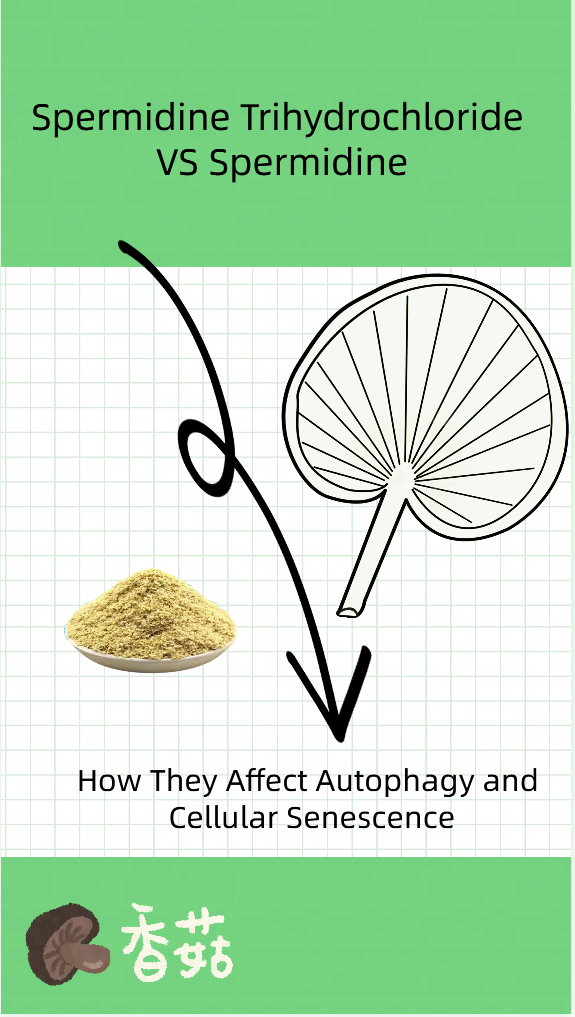Spermidine trihydrochloride and spermidine are two compounds that have gained significant attention in the field of biomedicine. These compounds are involved in various physiological processes and have shown promising results in promoting healthy aging and longevity. In this article, we will explore the science behind spermidine trihydrochloride and spermidine and provide a comprehensive comparison between the two.
Spermidine trihydrochloride is a water-soluble compound that has received much attention in the field of health and wellness. It belongs to the family of polyamines, organic molecules that occur naturally in all living organisms. Polyamines play important roles in a variety of cellular processes, including cell growth, differentiation, and cell death. Additionally, spermidine trihydrochloride has been found to have a wide range of potential health benefits, including the ability to stimulate autophagy, protect the brain, and promote cardiovascular health. As research continues, the full potential of spermidine trihydrochloride may become clearer. Although spermidine trihydrochloride is present in some food sources, such as wheat germ, soybeans, and aged cheese, natural dietary intake may not be sufficient to achieve optimal levels. In this case, supplementation becomes a viable option.
One of the most notable benefits of spermidine trihydrochloride is its role in autophagy, a cellular process responsible for removing damaged components and promoting cell regeneration. Autophagy plays a crucial role in maintaining the health and function of cells. By enhancing autophagy, spermidine trihydrochloride helps eliminate toxic substances and damaged proteins, thereby reducing the risk of neurodegenerative diseases such as Alzheimer's and Parkinson's.
Several studies have shown that spermidine trihydrochloride has a positive effect on cardiovascular health. It has been shown to improve heart function, lower blood pressure and prevent heart-related diseases. Spermidine trihydrochloride promotes vasodilation, enhances blood flow, and reduces the risk of atherosclerosis. By maintaining a healthy cardiovascular system, it can significantly contribute to a longer, healthier life.
In addition, spermidine trihydrochloride also has potent antioxidant properties. Oxidative stress caused by an imbalance between free radicals and antioxidants in the body is a major cause of aging and various chronic diseases. By neutralizing harmful free radicals, spermidine trisalt helps fight oxidative stress, thereby minimizing the risk of age-related health problems such as cancer, diabetes and inflammation.
In recent years, researchers have also discovered a link between spermidine trihydrochloride and its potential effects in promoting longevity. Studies in various organisms, including worms, flies and mice, have shown that supplementation with spermidine trihydrochloride increases lifespan and improves overall health. While further research is needed to fully understand its impact on human longevity, these findings hold great promise for spermidine trihydrochloride as an antiaging compound.
It is important to note that supplementation with spermidine trihydrochloride should be done with caution and under the direction of a healthcare professional. As with any supplement, dosage and potential interactions with medications should be carefully considered.
Both spermidine trihydrochloride and spermidine are members of the polyamine family and play important roles in various physiological processes in the body. While they share similarities in their health effects, there are also significant differences between spermidine trihydrochloride and spermidine.
● One of the main similarities between spermidine trihydrochloride and spermidine is their ability to promote autophagy, a cellular process responsible for the removal of damaged or dysfunctional components. Autophagy plays a crucial role in maintaining cellular health and has been implicated in various age-related diseases, including neurodegenerative and cardiovascular diseases. Both spermidine trihydrochloride and spermidine have been shown to induce autophagy, potentially reducing the risk of these age-related diseases.
● Another health benefit shared by spermidine trihydrochloride and spermidine is their potential to enhance cardiovascular health. Studies have shown that these compounds can improve heart function, lower blood pressure, and inhibit the formation of plaque in blood vessels. These effects are thought to be mediated through the ability to promote autophagy and stimulate the production of nitric oxide, a key molecule in maintaining normal blood flow and preventing the development of cardiovascular disease.
● While spermidine trihydrochloride and spermidine share similar health benefits, they also have some important differences. The most obvious difference is their management approach. Spermidine trihydrochloride is a synthetic form of spermidine that is commonly used as a dietary supplement. Spermidine, on the other hand, is a natural compound found in various food sources, such as soybeans, mushrooms, and aged cheese. This difference can affect the bioavailability and potential side effects of these compounds.
● Additionally, the overall potency of spermidine trihydrochloride and spermidine may be different. Since spermidine trihydrochloride is a more concentrated form of spermidine, it may provide more potent effects at lower doses than natural sources of spermidine. However, further research is needed to determine whether these differences in efficacy translate into significant differences in their health benefits.
● Additionally, spermidine trihydrochloride and spermidine may differ in their stability and shelf life. As a synthetic compound, spermidine trihydrochloride is generally more stable and has a longer shelf life than spermidine, which may degrade more rapidly. This difference may affect the storage and formulation of products containing these compounds.
Spermidine trihydrochloride is a synthetic compound derived from spermidine. Autophagy is an important cellular process that degrades and recycles unnecessary or dysfunctional cellular components. It plays a vital role in maintaining cellular homeostasis and preventing the accumulation of damaged molecules. On the other hand, cellular senescence is an irreversible state of growth arrest that occurs in response to various stresses and is associated with aging and age-related diseases.
Recent studies have shown that spermidine and its derivative trihydrochloride have the ability to regulate autophagy and cellular senescence. Spermidine is a naturally occurring polyamine present in all living cells where it is involved in a variety of biological processes including cell growth, vitality and tissue regeneration. By promoting autophagy, spermidine has been shown to have potential anti-aging effects.
One of the main mechanisms by which spermidine and spermidine trihydrochloride act is through the activation of autophagy. Autophagy is triggered by the formation of double-membrane structures called autophagosomes, which engulf cellular components destined for degradation. This process is regulated by a series of autophagy-related genes (ATGs) and various signaling pathways.

Studies have shown that spermidine and spermidine trihydrochloride increase autophagosome formation and enhance autophagic flux. This results in the removal of damaged proteins and organelles, promoting cellular health and preventing the onset of aging. In addition, spermidine has been shown to activate a key regulator of autophagy, the mTOR pathway, thereby further enhancing autophagic activity.
In recent years, spermidine trihydrochloride has attracted a lot of attention for its potential health benefits and anti-aging properties. While spermidine trihydrochloride can be obtained through dietary sources, there are ways to increase its levels in the body naturally.
One of the most effective ways to naturally increase your levels of spermidine trihydrochloride is through a balanced diet. Foods such as wheat germ, soybeans, mushrooms, and certain types of cheese contain high amounts of this compound. Incorporating these foods into your daily diet can help ensure you get enough spermidine trihydrochloride. It's important to note that cooking and processing can reduce the levels of spermidine trihydrochloride in these foods, so it's best to choose fresh and minimally processed foods.

Intermittent fasting, an eating habit that involves cycling between fasting and eating cycles, has also been found to increase levels of spermidine trihydrochloride in the body. Research shows that fasting for at least 16 hours stimulates the production of spermidine trihydrochloride, which promotes autophagy and enhances cellular health. However, it is worth consulting a healthcare professional before incorporating any fasting regimen into your routine, especially if you have underlying medical conditions.
Supplements are another option for naturally increasing spermidine trihydrochloride levels. Spermidine supplements come in many forms, such as capsules or powder, and can be found in health stores or online. When choosing a supplement, it's important to choose a reputable brand that offers a quality product. Consultation with a healthcare professional can also help adjust dosage to individual needs.
In addition to dietary adjustments, a healthy lifestyle can also support natural increases in spermidine trihydrochloride. Regular exercise, stress management techniques like meditation or yoga, and getting enough sleep have all been linked to improved overall health and cellular function. These practices can indirectly increase the levels of spermidine trihydrochloride in the body.
Post time: Jun-27-2023





